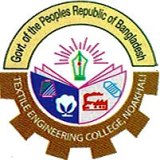Begumgonj Textile Engineering College, Noakhali
টেক্সটাইল ইঞ্জিনিয়ারিং কলেজ, বেগমগঞ্জ, নোয়াখালী | |
 | |
| Motto | "Textile Means Developing & Prosperity" |
|---|---|
| Type | public |
| Established | 2006 |
| Endowment | Government, Bangladesh University of Textiles |
| Principal | Engineer A.K.M. Fozlul Haque |
| Students | 320 |
| Undergraduates | 320 |
| Location | Noakhali , Chittagong , Bangladesh |
| Nickname | TECN |
| Website | btec |
Textile Engineering College, Begumgonj, Noakhali (Template:Lang-bn) is an engineering educational institute in Bangladesh, operating under the Bangladesh University of Textiles. It is one of the five textile engineering colleges which are directly controlled by Ministry of Textiles & Jute, Bangladesh.
History
During the British colonial rule from 1911 to 1929, 33 peripatetic weaving schools were established in East Bengal to meet the requirements for a textile technician by offering an artisan-level six-month course. Begumgonj Textile Engineering College, Noakhali is one of them; it was established in 1918. In 1968 it was upgraded to District Weaving School offering a one-year course and in 1981 District Textile Institute offering a two-year certificate course in textile technology. But the certificate course was not acceptable to the industry.
In 1993 a three-year diploma course was introduced under Bangladesh Technical Education Board (BTEB) which was treated as a milestone for the textile education. The duration of this course was extended to four years in 2001.
The college was upgraded in 2007 to offer a B.Sc. in textile engineering. The course is affiliated by the Bangladesh University of Textiles.
Curriculum

Textile Engineering College, Noakhali offers following B.Sc. in Textile Technology programs under the Bangladesh University of Textiles (BUTex).
- B.Sc. in Textile Engineering (Yarn)
- B.Sc. in Textile Engineering (Fabric)
- B.Sc. in Textile Engineering (Wet Process)
- B.Sc. in Textile Engineering (Apparel)
| First Year | Second Year |
|---|---|
The first-year syllabus consists of pure science in addition to some basic concepts of Textile Engineering.
|
From second year and onwards, students acquire a wide range of theoretical and practical knowledge in the area of Textile Technology and Engineering which equip them for future employment. Subject offered in second year:
|
| Third Year | Fourth Year |
|---|---|
Subjects offered in third year:
|
In the fourth or final year students have to choose a group of subjects for specialization. Subjects offered in fourth year:
|
Total credits: 144
Career prospects
The majority of textile graduates take up posts in the textile manufacturing industry as process or plant managers, development engineers or technologists.[citation needed] Recent graduates have found employment in the areas of production management, design, textile testing and quality assurance,merchandising, new product development, buying house, commercial banks, customs etc.[citation needed]
Workshops and laboratories
This article may contain an excessive amount of intricate detail that may interest only a particular audience. (September 2012) |
Yarn Manufacturing Laboratory
Provides practical knowledge regarding the yarn preparing technology: short staple (cotton) and long staple (jute). The laboratory facilities includes conventional and modern machinery with new technology like open-end spinning, air jet spinning etc.
Weaving Laboratory
The laboratory has the facility to weave cotton, synthetic and jute fabric including tappet, dobby and jacquard loom, hand-operated loom, ordinary-power loom, automatic-power loom and modern loom with CAD system. Modern looms include air-jet, rapier loom with electronic jacquard, projectile.
Knitting Laboratory
It is equipped with warp and weft knitting machinery. Warp knitting machinery includes raschel and tricot machines and weft knitting machine include circular (single jersey, interlock, rib, jacquard) and flat knitting machine.
Wet Processing Laboratory
The laboratory includes machinery of singeing, desizing, mercerizing, dyeing, printing and finishing. The laboratory has the facility to dye material as fibre, yarn and fabric form and styles of printing. The laboratory has a computerized data colour system, gas chromatography and mass spectrophotometer, light fastness and other quality control equipment.
Garments Laboratory
The garments laboratory is equipped with cutting, sewing and finishing machinery used in the garment industry. The laboratory is equipped with avLectra CAD-CAM System for computerized marker making and cutting and garments dyeing, washing and embroidery machine.
Testing Laboratory
The laboratory tests fibre, yarn and fabric. Thes laboratory has conventional and modern testing machines including Evenness Testing, Classimat, Single Yarn Strength Tester, Multifunctional Superba Tester, HFT and Electronic Microscope.so
Computer Laboratory
The computer laboratory provides for 40 students at a time, with internet facilities.
Electronic Laboratory
The laboratory is equipped with pneumatic and electro-pneumatic control system.
Physics Laboratory
Physics laboratory is equipped with machinery and equipment for graduate students.
Chemistry Laboratory
The Chemistry laboratory provides for 40 students at a time.
Engineering Workshop
Engineering workshop is equipped with lathe machine, universal strength tester, shaping machine, cutting machine, drill machine, welding machine, circular saw and tools for carpenters.
